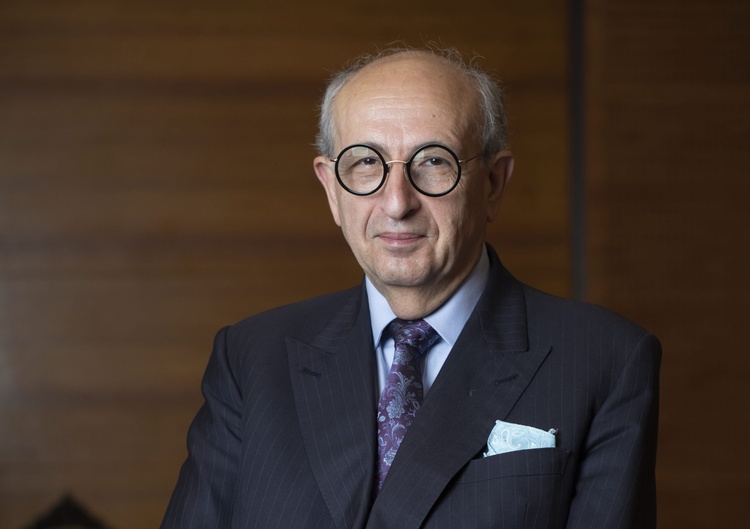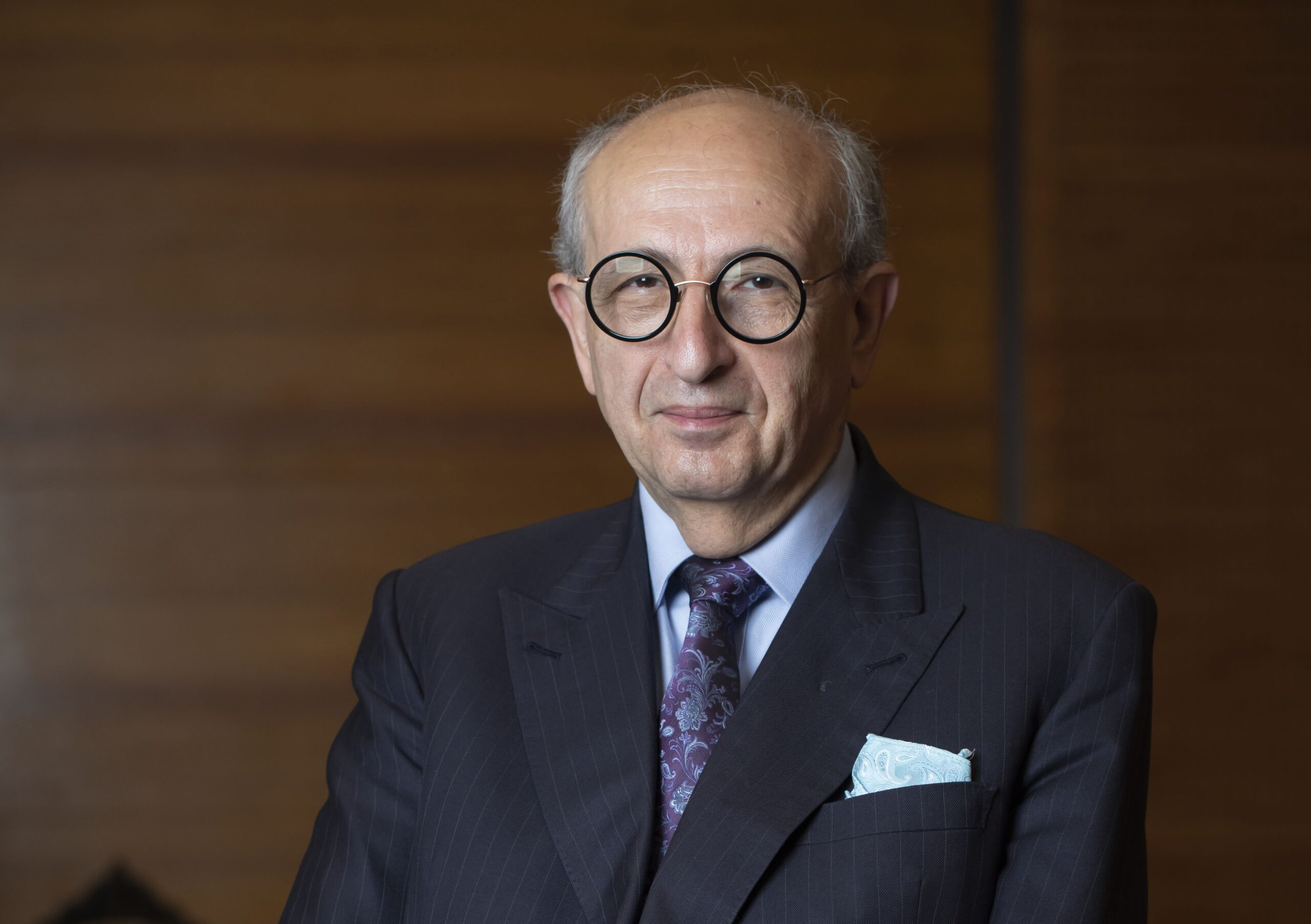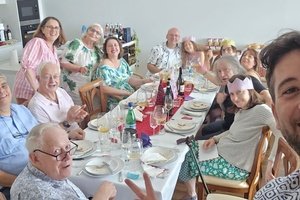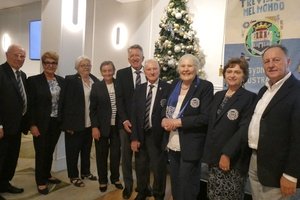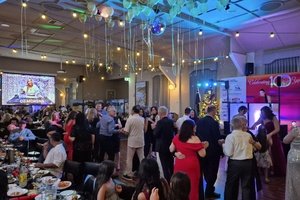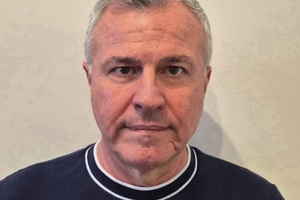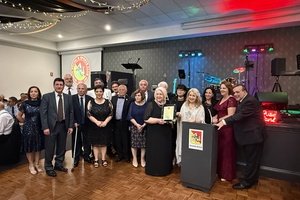Pagone greets me in his office, on the 18th floor of a building in the heart of Melbourne.
The space reflects his pride in his Italian heritage: old law books line a wall, while his desk features a small flag with the Sicilian Trinacria – the three-legged woman that symbolises the southern island – and a Botticelli-style artwork depicting a woman immersed in nature by a stream.
“My great-grandfather Salvatore had a house built in Catania, just outside the city centre,” Pagone says.
“Several years ago, I set foot in the old house and found this wonderful painting that you see on my desk on the ceiling of the main room.
“I instinctively took a photo of it, which I then had printed on a canvas and a blanket.
“I’ve never found out who the artist was – probably a local painter – and why my great-grandfather had wanted the painting in his home.”
Though he was born and raised in Melbourne, Pagone recalls having always felt an indelible bond with his parents’ homeland.
Both hailing from the Sicilian city of Catania, Pagone’s parents met in Africa in the 1930s, during the era of colonialism; just before World War II, the Italian Empire occupied Albania, Libya, Eritrea, Ethiopia and Somalia.
The couple married and gave birth to their first two children on that colonised land.
“That was madness on behalf of the Italian government,” Pagone says.
“My father was an accountant, but his career was interrupted with the outbreak of the war.
“My parents decided to migrate to Australia in 1953, to seek job opportunities.
“The war was over, Italy’s economic boom of the 1960s hadn’t yet occurred, and the country was afflicted by extreme destruction.
“The idea was probably to save up for a while and then go back.”
Pagone speaks fluent Italian, a skill he can thank his parents for; they insisted that only standard Italian be spoken at home, forbidding the use of English and dialect.
“My father was unable to resume his career in Australia, because he would’ve had to study to adapt to the country’s standards,” Pagone explains.
“Instead, he opened a pastry shop in North Melbourne, carrying on the family trade he’d learned in Sicily.
“He was very talented and creative.
“There’s still a very heated debate today about who was the first to make pizza in Melbourne, but I’m sure it was him; I have a black and white photo of him in the shop in the early 1950s and he was already selling pizza slices.”
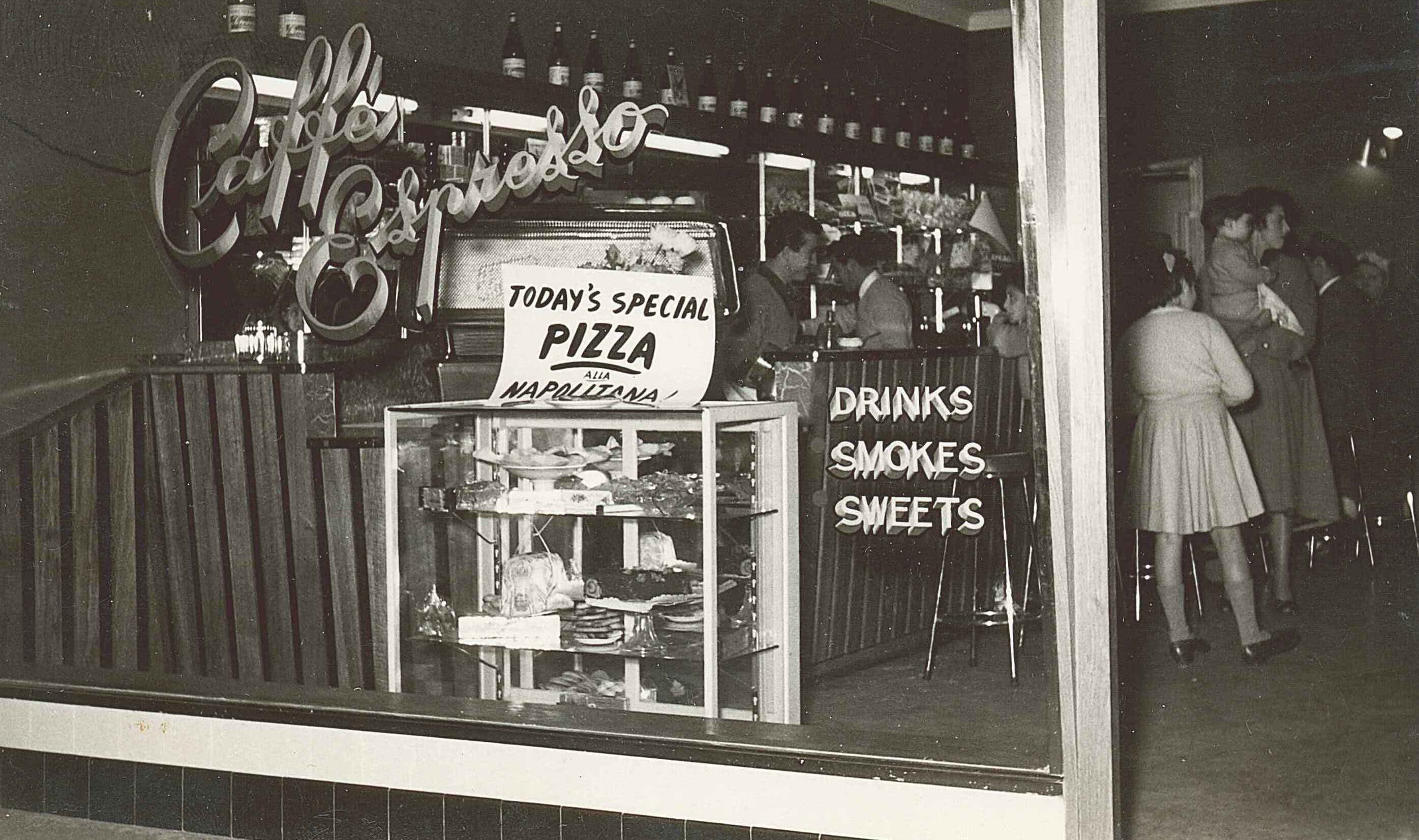
Photo supplied
During a complex time in Australia, in which new migrants were looked upon with particular contempt, a young Pagone decided to undertake a law degree.
At the time, he hadn’t considered a career in law; rather, he enrolled because his high academic scores gained him entry to the Faculty of Law at Monash University.
“The idea was to stop if I found something more interesting,” he explains.
Shortly after, when his father died from cancer, Pagone decided to take some time to reflect, devoting himself to teaching for a while.
He returned to law in 1980, but found working as a lawyer to be “very boring” and went back to teaching.
“I was also a lecturer in law at Monash, a job that I really enjoyed,” he says.
“When I started practising law again, an unexpected interest suddenly surfaced.
“I found the challenge of lawsuits and battling against other lawyers – and sometimes judges as well – to be very demanding but also a lot of fun.
“I won all of the cases, sometimes even those that I shouldn’t have.”
Pagone’s initial uncertainty soon turned into immense passion that fuelled an extraordinary career.
Pagone practised widely in taxation law, commercial law, administrative law, constitution law, public and human rights law during his career at the Bar.
From 2001 to June 2013, Pagone was a judge of the Supreme Court of Victoria.
He then served as a judge of the Federal Court of Australia until March 2018.
While Pagone has had a highly successful career, it was not devoid of challenges.
“It was often difficult and my conscience suffered at times,” he admits.
“At the Federal Court of Australia, there were tons of cases of migrants who were sent home for various reasons to do with their visas.
“However, in the time since they’d arrived, they’d created families and built lives here.
“It was difficult in those cases to apply the law.
“I remember a lawsuit that involved a 70-year-old man, who’d been a permanent resident in Australia from an early age and was married with children and grandchildren here.
“In our country, if you commit a crime with a sentence of more than 12 months in prison, you can lose your visa and be deported.
“How can we kick out citizens who arrived in Australia as children and who learned about crime right here?
“We had to send them away just because in the last 50 years they hadn’t had the foresight to apply for citizenship, at a time when it wasn’t even mandatory.
“Those moments weren’t easy at all.”
In recent years, Tony Pagone worked as Royal Commissioner of the Royal Commission into Aged Care Quality and Safety, alongside Lynelle Briggs.
In the final report, delivered in February 2021, they formulated 148 wide-ranging recommendations for a reform of the aged care system.
In his introduction, Pagone mentioned the Sicilian author Giuseppe Tomasi di Lampedusa, writing:
Change is needed but the change must be real. We hear often the laconic lament that the more things change, the more things remain the same. The Sicilian author Lampedusa in the book Il Gattopardo put the idea more cynically when a character in the novel says that ‘Everything must change for everything to remain the same’. We must ensure that neither occurs in the outcome of this Royal Commission: the change must be real, it must not be more of the same or a change calculated to keep things as they are. Piecemeal adjustments and improvements are unlikely to achieve what is required. Good people, well intentioned, doing the best they can, may unwittingly cause the biggest problems. Such people cannot fix the system without a complete overhaul of its structure. A philosophical shift is required. This means a new system empowering them and respecting their rights. An independent Aged Care Commission with guaranteed funding through a hypothecated Aged Care Levy will, in my view, create the substrate upon which this change in philosophy can flourish.
Pagone admits that when he was young he wasn’t overly involved in the Italian community, but he never stopped speaking his parents’ language, and now his children, Clara Francesca and Riccardo, speak fluent Italian and continue to respect their grandparents’ culture and traditions.
Almost “feeling guilty for not having done it before”, Pagone became active in the Italian community following the death of his mother, who passed away 10 years after his father.
He co-founded the Sicilian Association of Australia and was the president of CO.AS.IT. from 2006 to 2010.
He was also appointed as Queen’s Counsel in 1996, and was the president of the International Association of Judges until last year.
Last month, Pagone was appointed as a Member of the Order of Australia (AM) in the 2022 Australia Day Honours for “significant service to the law, to the judiciary, and to professional associations”.
To honour the prestigious acknowledgement, the Australian Italian Lawyers Association (AILA), of which Pagone is patron, will host an event on February 23 at the Savage Club.
While his career in law has had its ups and downs, Pagone admits that he “always had fun”, apart from the Royal Commission, which he defines “a disaster from start to finish”.
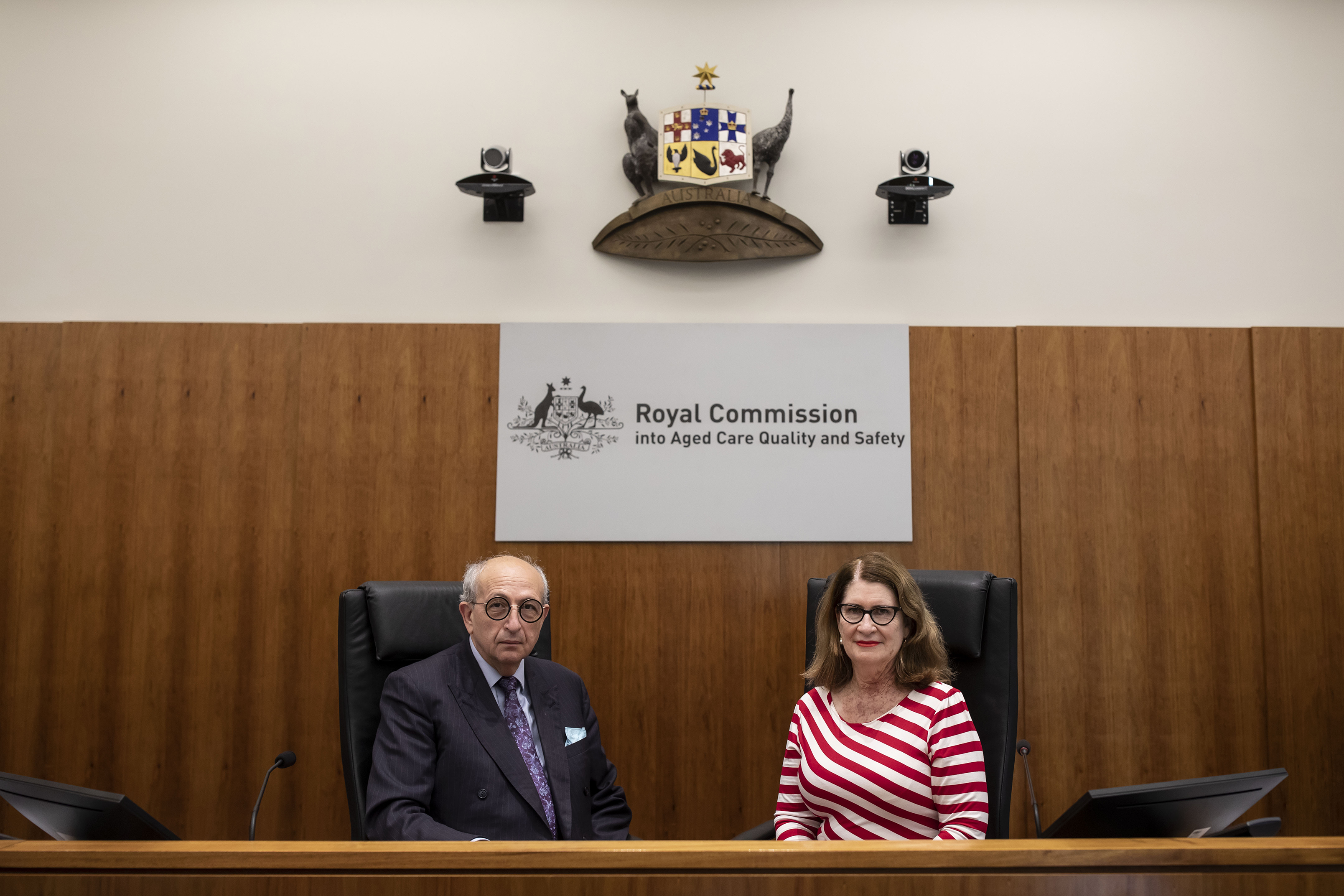
Royal Commissioners of the Royal Commission into Aged Care Quality and Safety, Tony Pagone and Lynelle Briggs. (Photo: AAP)
He also claims that he had luck on his side at times.
“Nobody believes me when I say this,” he adds.
“Lots of new lawyers ask me how to build a successful career, and my answer is always the same: 90 per cent of any success is due to luck.
“The latest award is an honour for me, but I hope that it also helps the community.
“When I first became a judge in 2001, many Italian lawyers felt proud, as though we shared the honour.
“It was nice and I’d be happy if the same thing happened with this recognition.”

